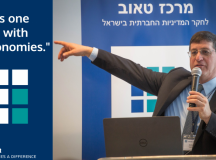Tal Schneider is diplomatic and political correspondent for Globes in Israel and is a former DC correspondent for Maariv newspaper. She spoke about the election to Richard Pater, head of BICOM in Israel, on 3 September.
Richard Pater: How is this election similar or dissimilar from the one held in April?
Tal Schneider: The current campaign is completely different to the April campaign because this is the first time we are having an election because Prime Minister Benjamin Netanyahu failed to form a governing coalition. Therefore, he is approaching this round without holding the upper hand. People now see him as someone who could lose (or, rather, who is not always the winner) and that makes it different. He may well not be able to pull it off this time.
RP: Is it still the case that the election is a referendum on Netanyahu, or have other issues emerged during the current campaign?
TS: Electoral campaigns in Israel are always about security. There are other issues, sure, but come election day, it always comes down to defence and security. The big political issue this year (and over the last few years) concerns Netanyahu being a suspect in three criminal cases, but I believe that the Israeli public separate the criminal cases and the politics when they vote.
When you talk to the people on the street, the issue that people care most about is security, security and security. The Israeli public is very much involved in the news cycle and aware of the threats. Many people live on the borders and they know exactly what is going on because it is all over the news all of the time. It is 24 hours of having to deal with it all. Even through March, April and the summer period, it was widely reported that we had rockets coming down on our villages and there were reciprocal IDF activities on foreign land. When you try to understand why Netanyahu is popular in Israel, I think it is that many people see him as very effective on that front, and they trust him on that front. I do think that Blue and White are giving him a good fight in this campaign (and did so in the April campaign) because they are headed by three former IDF chiefs. Blue and White was relatively successful because of their amazing security credentials. As I say, it is all about security here.
RP: Are the main parties sticking with the kind of campaigns they ran in from April, or are they trying different approaches?
TS: I think the political parties are trying to react to news cycle, because they have to be in the news cycle. In this campaign, for example, the Likud attempted to tap into the Russian immigrant community in order to enlarge their voter base and the right-wing bloc. However, as we approach the last two weeks of the election campaign, it does seem that this strategy simply has not worked. This is demonstrated by Netanyahu’s attempt to use the images of himself with Russian President Vladimir Putin on huge campaign posters on high-rise buildings in central Tel Aviv. It was really illuminating to talk to older and younger Russian-speaking Israelis who were actually really turned off by these images because one of the main reasons they left Russia was because of Putin and Putin-type figures in the Russian administration. In fact, the posters were put up approximately six weeks ago after mass demonstrations were brutally suppressed in Moscow. This was very insensitive on behalf of the Prime Minister. He was not campaigning in the right way and it simply did not work out for him.
On the other hand, with Blue and White, though Benny Gantz was the ‘new kid on the bloc’ during the April campaign, that trick only works once. You cannot be the new kid on the bloc in the summer when you have already campaigned as such in the winter! Back in April, he was withholding interviews and going in for ‘the silent treatment’, but during this campaign he has attempted to be more talkative and responsive. Obviously, he does not have the media experience that Netanyahu possesses, so he has misspoken, made some mistakes and there have been some stutters. In fact, some of his speeches and interviews were really poor. At the end of the summer he really had to get a grip on himself in terms of how you present yourself on television. His performances were poor, particularly when you compare them to the very eloquent and fluent Netanyahu. Gantz is facing the most incredible and charismatic politician that Israel has ever known, which is really tough.
RP: What do you think about Benjamin Netanyahu’s famous Gevalt Campaign? Is this an approach that we will see in the next few weeks and how do you rate its chances of success?
TS: Right now we are talking to each other about two weeks before an election, and this interview will appear with one week to go. So far, to the extent there is a ‘Gevalt’ Campaign it is mainly about the Israeli media: ‘the media is out to get you’, ‘witch hunt’ and so on. This is supposed to get the people to hate the media and therefore vote ‘against the media’. This is interesting because Netanyahu is not telling them to hate Benny Gantz or Ehud Barak. He is telling them that the Likud hate Channel 12 and Channel 13 and therefore one should vote because you do not want these organisations to make decisions for you. Is that a Gevalt Campaign? Well, it is sort of a Gevalt campaign.
He is also talking very much to the religious Zionists. He thinks that he can only enlarge his base on the right-wing of the right-wing. He is talking to people on the extremist fringes of the political right. He does not even try to campaign for the centre bloc. In elections politicians usually soften their tone to appeal to moderate centrist voters. Netanyahu does not work in that way. His campaign is calling on voters to be responsible and not let the left win because this is ‘dangerous for the future of the country’. Hence the Likud campaign posters, with their images of Hezbollah leader Hassan Nasrallah and other Iranian figures, saying something along the lines of ‘if you do not vote for the Likud, then these individuals will take over’.
RP: He has done this before with ISIS and Isaac Herzog and the Zionist Union.
TS: It is always the same during electoral campaigns. He will say that if you do not vote for the Likud, then you get this media person controlling you or if you do not vote for the Likud, then you get Hassan Nasrallah. He puts the media and Hassan Nasrallah on the same level.
RP: The polls have been consistent throughout the campaign period, showing that neither main party can win without the support of Lieberman. Do you see either party breaking the deadlock and reaching 61 Knesset seats?
TS: In Israel, the concept of ‘blocs’ was never written into law. It is an invention of the Israeli media. Israel is really a multiparty system. It has been very normal in Israel’s history to build a diverse coalition of left, right and centrist political parties. Netanyahu is arguing that he only wants a right-wing government, without “dangerous leftists and liberals,” but this is very different from previous Israeli governments (even up until the 2015 election). It used to be the norm to talk to your political adversaries and ask them to be partners. For example, the Sharon government was a centre-right government but it was welcoming and comparatively diverse. Of course, coalition governments can’t be excessively diverse, but nor do they have to be so one-sided.
Netanyahu has broken this long tradition over these last few years, but when you look at the polls it does look like, if he emerges victorious, he will have to talk to Israel’s centrists, liberals and leftists and try to convince them to join his coalition. Of course they will come with demands and it will not be easy.
One of the things that he got wrong in April was the viciousness of his campaign against Gantz. I think that this was hurtful for Gantz and it meant that after the election, when Netanyahu really needed to speak to him, it became impossible. That is why I think this campaign has been a degree more respectful, without hints or suggestions regarding Gantz’s personal merits. My understanding is that the Likud understand that they will have to approach him. Of course it goes both ways; Gantz will have to approach Netanyahu, but Gantz did not bash Netanyahu during the April campaign as severely. He did attack him about his criminal cases but there were a lot of things that he could have tried to use to trash his reputation but he did not go there in April, and he has not gone there this time around either.
RP: Gantz has also been adamant that he will not sit with Netanyahu. Do you think that is just election talk, not to be taken too seriously?
TS: Gantz has been insisting that he will not sit in a Netanyahu-led government while Netanyahu is being indicted. We do not know if Gantz will stick to this word. He obviously stuck to his word in April; he promised to not sit with Netanyahu and he fulfilled his promise, in contrast to Labor leader Avi Gabbay who really betrayed his voter base. I think it will be decided by numbers. Gantz (and all other leaders) will be heavily criticised if the country goes to a third election. They might agree a compromise whereby Netanyahu serves until the Attorney General makes his decision regarding the ongoing corruption cases in December.
RP: Can Lieberman be persuaded to serve in a Netanyahu-led government?
TS: Lieberman is talking a lot about a national unity government and has not ruled out Netanyahu being included in that government. Again it will depend on the numbers. If Lieberman receives more than 10 Knesset seats then he will be a very powerful person.
RP: Can you make a final prediction?
TS: It is too complicated. I do think that the Likud always gets more seats than the pollsters predict. The polls currently predict that the Likud will receive 30 to 31 Knesset seats, so I think that they could win 34 Knesset seats. However, I do not know who will lose from that scenario and whether those seats come from Shaked or Lieberman.





































